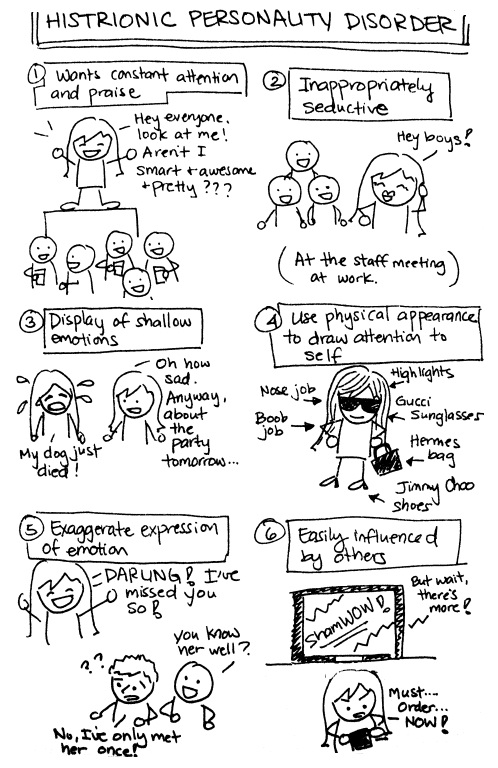I can’t believe I’ve never written a post before about narcissists and sex, but sex is one of the biggest ways they manipulate and control the rest of us.
Many people mistakenly believe narcissists love sex. Actually, that isn’t true. They’re not even especially promiscuous. In fact, many narcissists are downright prudish. People with Borderline or Histrionic Personality Disorder are much more likely to be promiscuous, because in their minds, sexual attention is equated with love and acceptance.
Narcissists don’t love sex. Sex is merely a tool they can use to get what they want or to control or manipulate their victim. There are two kinds of narcissists: cerebral and somatic. While very different on the surface, at heart they really aren’t very different at all. Neither has any empathy and neither has any desire to emotionally connect to another person and will go to great lengths to avoid it. This means neither a cerebral or somatic narcissist is capable of making love to another person because making love implies an emotional connection to someone else.
Cerebral narcissists.
Cerebral narcissists are the pretentious, insufferable intellectuals and achievers of the world. They think they’re smarter or more successful than everyone else and go to great lengths to be adulated and admired for their “intellectual superiority” or “successful lifestyle.” Cerebral narcissists often hate sex and avoid it. They may even be prudish, especially if religiously-bent (many of them are, because religion gives them “permission” to be hateful and judgmental toward others).
Cerebral narcissists suffer the deepest narcissistic injury when their intellectual prowess or success in the material world is threatened, someone else is deemed smarter or more successful than they are, or they are exposed as being of only average intelligence or ability. Because they aren’t normally promiscuous, they may be either asexual, or (to maintain the image of normality which benefits their lifestyle, or to fend off loneliness), they may desire to attract a spouse, which means sex is used to draw a potential mate to them and/or maintain a loveless marriage. Sex is never an expression of love or emotional connection, because love and genuine emotional connection are things all narcissists avoid like the plague and are incapable of anyway.
Sex with a cerebral narcissist is likely to be cold, machine-like, and lacking in spontaneity and emotional expression. The other partner is bound to feel frustrated and unfulfilled–and of course the narcissist could care less. A cerebral narcissist may also withhold sex as “punishment” or to control their partner. While not usually promiscuous, some male cerebral narcissists may go outside their marriage (such as to a prostitute) to fulfill their physical needs, since to them, sex with someone they don’t know or have a responsibility to is preferable because there’s no risk of emotional complications or demands from the sex partner.
Somatic narcissists.
Somatic narcissists are concerned with their body image, health, or physical appearance. They believe themselves to be the most handsome, beautiful, or sexiest person in any given room. They go to great lengths to maintain and embellish their most prized possessions–their own bodies. They may use sex as a way to woo potential partners because they know they can. But they don’t genuinely enjoy sex; it’s merely a tool to get them the attention and praise they want. As with the cerebral narcissist, they’re incapable of making love–that is, feeling emotionally connected to another human being through the sex act.
Some somatic narcissists may be promiscuous, but unlike a Borderline, sex isn’t a “replacement” for love. It’s a tool that is used to control and manipulate a potential victim. A woman with somatic narcissism who has maintained an attractive body and style knows her sexual attributes are most likely to win her a potential mate. She knows she can bewitch a man with her body and doesn’t hesitate to use it for that purpose. But once she has won him over, she’s likely to begin to devalue and eventually discard him. If he has attributes she thinks she needs (money or success), she may even marry him because it benefits her lifestyle. But she’s likely to get bored and be unfaithful. It’s a game to her; sex is just the advantage she knows she has to win the game. Lest anyone think I’m being sexist here, there are plenty of somatic narcissist men who act the exact same way, and the women they attract mean nothing to them except a means to an end.
A few narcissists who have become sociopathic may even use sex as a means to control and terrorize their victims. In their minds, it has become equated with violence and rage. Some serial killers like Ted Bundy (diagnosed with NPD) use sex this way, to dehumanize and destroy their victims. Even some who aren’t murderers may use sex this way, like the abusive husband who mercilessly rapes his wife while he beats her.
What is good sex really? And why aren’t narcissists capable of it?

Good sex is fun. It can be an incredible physical release. But without genuine emotional connection, it’s really no better than a drug–a temporary “fix” that might make you feel good for a little while, but doesn’t last and is ultimately unsatisfying.
Although being emotionally committed to another person isn’t all fun and games, and can be hard and sometimes painful work, sex between two people who genuinely love and care for each other transcends its physical boundaries and becomes a spiritual thing that only human beings are capable of. It leaves the realm of the animalistic and physical and becomes something that transforms both partners and connects them to the divine. Lovemaking requires complete vulnerability–it’s one of the only times in life (outside of childbirth and breast-feeding) that a person is both physically and emotionally naked with another person, leaving nothing hidden.
Such utter vulnerability makes lovemaking scary to many people. And it’s more scary to a narcissist than to anyone, because they’re so terrified of ever appearing vulnerable to someone else. It requires a level of trust they simply aren’t capable of. Even non-narcissists often find it difficult to connect with another person on such a profound level, and I think that’s what’s behind the shame and embarrassment people have when the “S” word is mentioned. It’s also what’s behind the almost universal corruption of a God-given act of love into something sordid, base, and shallow–almost the polar opposite of what it was intended to be.
A word about limerence.
Most narcissists are entirely capable of limerence, a feeling of strong infatuation that is often mistaken for love. It’s not a bad thing in itself. Indeed, many long lasting relationships and marriages begin with limerence or “falling in love.” To make the transition to a healthy long term relationship, limerence must become replaced or be transformed into genuine attachment and feelings of deep caring about the other person. Limerence isn’t love and it doesn’t last. You can become limerent about a celebrity but you certainly don’t “love” them since you don’t know them at all. It probably evolved as a way humans could attach to someone else long enough to bear a child and see it through the first year of life, when an infant is at its most vulnerable and needs two parents. Research suggests that intelligent mammals, such as dogs, cats and monkeys, may feel the entire range of “human” emotions, and this includes feelings akin to limerence as well.
Limerence is actually very narcissistic. It’s common for two people who have just met and are “falling in love” to say things like, “I can see myself in your eyes,” or “I feel like we’re one person.” Popular music is filled with such sentiments. The person you’re limerent about becomes a kind of mirror. You aren’t seeing them as they actually are; you are projecting your own needs onto them and imbuing them with qualities you desire but they don’t necessarily actually have (if they do, it’s a happy coincidence-and that could become the basis for genuine love). A narcissist in limerence can SEEM vulnerable and loving, and in the beginning of a relationship with one, no one can act more romantic. You’ll be wined and dined and woo’d with flowers and candy until you develop diabetes. But all these gifts and promises of undying love aren’t about you at all–it’s all about them and what they think they see in you that can give them what they want and need. Once you reveal that you’re only human and can never be all things to them, the D&D will begin and they will think nothing of tossing you in the trash like an old broken mirror, as if they never knew you at all.























